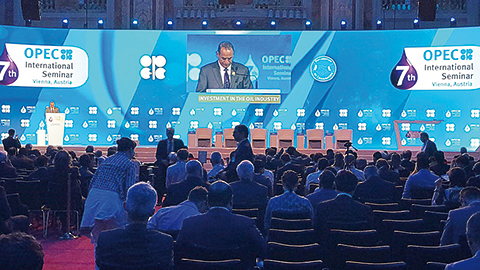 VIENNA: Kuwait’s Minister of Oil Bakheet Al-Rasheedi speaks during the organization’s 174th conference in Vienna on Friday. —KUNA
VIENNA: Kuwait’s Minister of Oil Bakheet Al-Rasheedi speaks during the organization’s 174th conference in Vienna on Friday. —KUNAVIENNA: OPEC and non-OPEC oil ministers came together in Vienna yesterday with an agenda mainly involving never-ending cooperation purposed to ensure a stable global oil market. The gathering followed an OPEC decision earlier Friday to boost output rates by one million barrel per day (bpd) in a bid to fend off a looming energy shortage. Oil ministers ascribed the move to an OPEC yen to answer the growing crude needs of major consumers worldwide. OPEC, and non-OPEC producers, with Russia on top, agreed in late 2016 to cut output by 1.8 million barrels daily to stabilize world oil markets. A six-month agreement came into effect on January 1, 2017, and was later extended for nine months as of July 1, 2017.
Significant deal
Kuwait's Minister of Oil Bakheet Al-Rasheedi affirmed the significance of the deal reached by OPEC's oil ministers during the organization 174th conference, stipulating rec-commitment to slashing crude oil output by 100 percent.
This means adherence to the cooperation declaration, cutting the production by 1.8 million barrels per day, the minister said in a statement. Moreover, the decision affirmed OPEC's role to secure supplies to the oil markets, he added.
Asked whether the deal would secure balance between supply and demand, minister Rasheedi said the agreement tackles a number of matters, namely preserving the joint action in OPEC and bolstering its role to meet the market needs. Pumping some one million barrels per day to the oil markets will alleviate jitters with respect of the supplies and ensures the market stability, he elaborated. The deal will be followed up to lift the daily output by some one million barrels, where the ministerial committee and the technical commission will monitor the accord implementation, which should in effect as July 2018.
Satisfactory results satisfactory
Algerian Energy Minister Mustapha Guitouni said that the outcomes reached by the meeting were very good enough as they reflect the organization's stability. The organization is on the right track, and could through wide negotiations among ministers achieve balance between supply and demand, and raise output by one million bpd, he added in a press statement.
He revealed that the OPEC energy ministers agreed that Algeria would host the next meeting due in September, with the aim of assessing the agreement on raising production and its compatibility with the global oil markets and the reality. The Algerian minister expressed, on the eve of the meeting, his optimism over the agreement, saying that he was very satisfied over the outcomes as they help protect interests of both consumers and producers. He noted that he held negotiations with a number of OPEC officials in order to bring views closer together that aimed to reach a final deal. - KUNA










